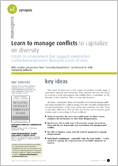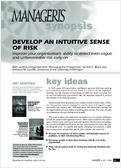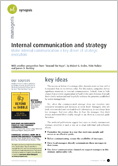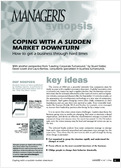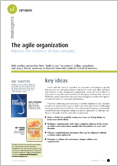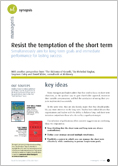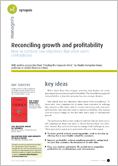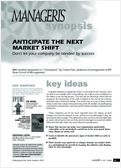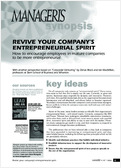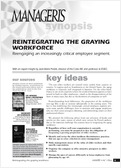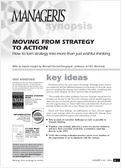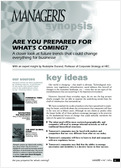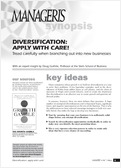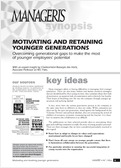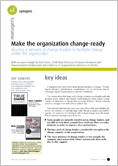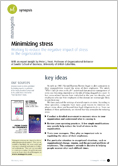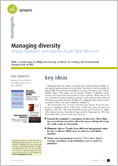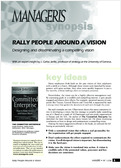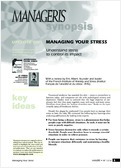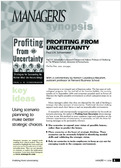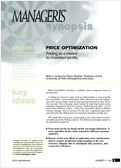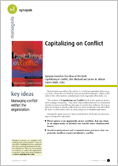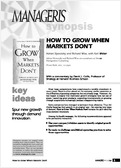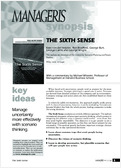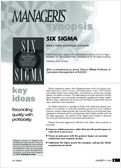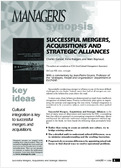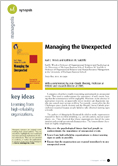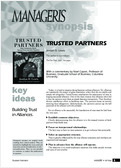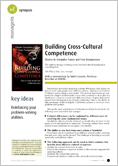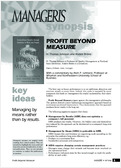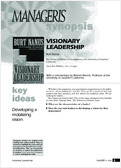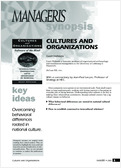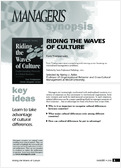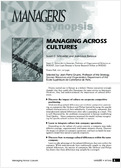
Synopsis
This article is one of the sources used in Manageris’ synopses:

Build a constructive relationship with your boss
Employees are frequently frustrated by their relationship with their boss. Is this inevitable? Not necessarily. For the relationship to be successful, employees and their superiors must share responsibility. How to define your positioning as a subordinate?

Manage informal performance factors
Lack of motivation, withdrawal, resistance, and infighting are all phenomena difficult to control with formal management drivers alone. How to influence informal performance factors?

Decision-making traps
Decision-making processes are strewn with traps. How can we identify and avoid the psychological biases that cause us to make mistakes?

Promote accountability in your organization
How can leaders get their teams to share responsibility for ensuring collective success?

How to become a good listener
The ability to listen is both one of the main tools of managerial influence, and the most underestimated. How can you develop listening skills to improve your interpersonal relationships?

Creating value in an interconnected world
In an unpredictable environment, the key to agility is not necessarily possessing proprietary resources, but being able to mobilize those required when needed.

Keeping up with the Times
In addition to specific shifts in customer expectations, technology, etc., how to integrate cultural shifts that affect the company's strategic environment?

Changing behavior
How can you ensure lasting change and avoid falling back into the same old habits? Lasting behavioral change requires a combination of logic and emotions.

Protect yourself against strategic blindness
Well-established companies that believe they are invulnerable are often in for a rude awakening. How can you avoid the tendency to ignore unpleasant truths?

Combining individuals into a real team
How can you capitalize on differences to work together more effectively and create real team momentum?

The dangers of success
Success itself is often the root cause of failure, as people become lazy and arrogant, or overly optimistic about the future. How to recognize and avoid the traps of success?

Make compensation a key motivational driver
What compensation policy to adopt to foster employee adhesion and stimulate company performance sustainably?

Habit marketing
Rather than trying to respond to clearly identified customer needs, companies may do better by working to become part of their routine.

The delicate art of apology
Everyone seems to be apologizing these days. Indeed, the ability to apologize is a key component in building trust.

Toxic work environment, a real management issue
The quality of the ambiance at work is largely rooted in the management model, and has major repercussions on performance. How to combat infighting and other types of toxic behavior?

Foster collaboration within your leadership team
The leadership team's ability to work together effectively has a major impact on the performance of a business. What key drivers can be used to break down silos in the leadership team?

HR as strategic partner
More than ever, the HR division has a major role to play in corporate strategy. How to assume these responsibilities without being overwhelmed by day-to-day operational emergencies?

The narrative leader
Presenting purely rational arguments is not enough to influence people on a sustainable basis. How to use storytelling to develop your influence?

How can the board of directors add more strategic value?
In an uncertain economic context, how can the board of directors add real value to the quality of strategic company decisions?

Combat misunderstandings
Many psychological traps make interpersonal communication difficult. How can you combat misunderstandings and communicate better to facilitate interactions?

What is the best approach to using social networks?
Social networks offer new perspectives in marketing approaches. How to fully tap these opportunities to really get value from them?

The keys to lateral leadership
Today, hierarchical authority is becoming less effective in obtaining the adhesion of partners and employees. Managers must thus develop their lateral leadership skills.

Customer service: cost center or competitive advantage?
Taking the time to listen to customers may well be an effective way to identify their problems and understand their expectations better.

Adopting innovations developed outside your organization
Innovation is influenced by fashion trends. Lucidity, strategic thinking and rigorous analysis are valuable assets to avoid wasting a lot of time and energy.

Developing a greener offering
Customers now generally expect companies to be environmentally responsible. Businesses that ignore this expectation risk being sidelined!

Make better decisions to be more responsive
For a company to become more agile, managers and leaders must make decisions faster and more frequently. How to avoid negatively affecting the quality of decisions?

Information, a strategic asset
More than ever, companies have access to an impressive wealth of information. But they can only fully capitalize on this strategic asset if they develop a real information management strategy.

The delicate art of delegation
Organizations need to be agile and responsive, and this means empowering employees. But how to avoid the many dangers of poorly managed delegation?

Every-day ethics
How to resolve day-to-day ethical dilemmas? By developing great lucidity, clarifying your values and applying rigorous decision-making processes.

Generation Y at work
The attitudes of the youngest generation to enter the workforce reflect a profound sociological shift. Understanding this generation better is essential to work with younger employees more effectively.
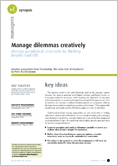
Manage dilemmas creatively
In the face of dilemmas, tradeoffs or compromises are rarely satisfactory solutions. How can we approach dilemmas creatively?
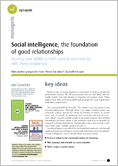
Social intelligence, the foundation of good relationships
Managers must be able to develop positive relationships with those around them to obtain the adhesion of their teams. How can you develop social intelligence?
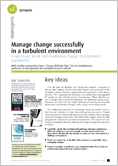
Manage change successfully in a turbulent environment
In a shifting environment, where change is no longer a periodic event, but a continuous movement, companies must adapt the traditional approach to change management.
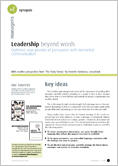
Leadership beyond words
How to be a persuasive leader? By mastering your body language, which is a more powerful vector of communication than words.
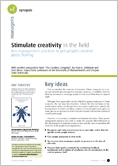
Stimulate creativity in the field
How to stimulate the creativity of your employees? In addition to establishing sophisticated systems to collect ideas, companies would do well to adapt management practices accordingly.
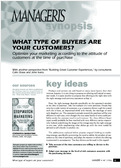
What type of buyers are your customers?
Different types of customers have very different attitudes when they make purchases. How to optimize your marketing to integrate the mindset of customers about buying your products or services?

Obtaining commitment through participation
How can you get the people of your organization to commit themselves and show a sense of initiative? By creating the conditions that enable them to participate in the company strategy.
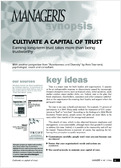
Cultivate a capital of trust
Being trustworthy is not enough to inspire trust. To maintain good relationships, companies must continuously cultivate their trust capital.
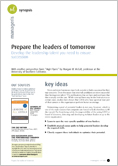
Prepare the leaders of tomorrow
Many companies are obliged to look outside the company for a new CEO, given the lack of credible home-grown candidates. How to establish an effective system to detect and prepare the leaders of tomorrow?
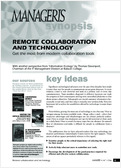
Remote collaboration and technology
Blogs, social networks, wikis, etc. are not just fashionable trends, but represent a fundamental shift in the business world as well. How can companies truly master these technologies to reinforce their remote collaboration systems?
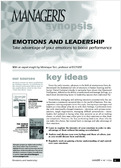
Emotions and leadership
Long rejected by the business world, emotions are now accepted as a normal part of the landscape. How to manage your emotions effectively in order to capitalize on their power to drive performance?
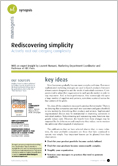
Rediscovering simplicity
Companies tend to become more complex and thus more sluggish over time. Rediscovering simplicity can thus be a major performance improvement driver.
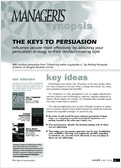
The keys to persuasion
Managers must be able to persuade others every day. To do this effectively, they must learn to adapt their persuasion strategy to individual decision-making styles.
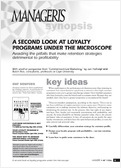
A second look at loyalty programs under the microscope
Loyalty programs can be a powerful performance driver, but not at any price! How to preserve margins by distinguishing between profitable and unprofitable customers in order to retain the former, but not the latter?
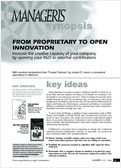
From proprietary to open innovation
How to revitalize your ability to innovate in a world where new products and services are introduced at a dizzying pace? By opening your R&D to the outside world.
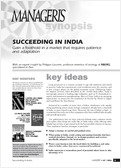
Succeeding in India
Many businesses are interested in taking advantage of the huge potential of the Indian market. However, gaining a successful foothold in India takes perseverance and real effort to adapt.
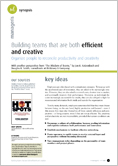
Building teams that are both efficient and creative
The current business environment requires people to develop both their productivity and their creativity. What organization to adopt to reconcile these two demands?

Overcoming resistance to change
Change is emotionally draining on employees. To surmount resistance, companies must understand the underlying psychological barriers.
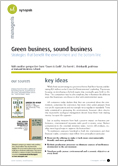
Green business, sound business
How to reconcile environmental care with economic performance? As for quality improvement measures, ecological initiatives can contribute to improving profitability.
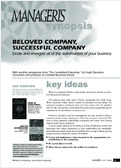
Beloved company, successful company
The success of a business appears to depend primarily on the existence of a shared mindset. What if enthusiasm were more effective than discipline in business success?
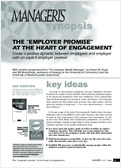
The “Employer Promise” at the heart of engagement
As the relationship between employers and employees has changed, defining an explicit employer promise is a good way to instill a powerful bond of trust.
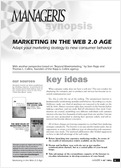
Marketing in the Web 2.0 age
The emergence of the Internet has caused some fundamental market shifts, specifically in terms of consumer behavior. How to adapt your marketing practices accordingly?
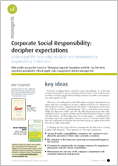
Corporate social responsibility: decipher expectations
Corporate social and environmental responsibility has become a real challenge. Yet, to guide efforts in this domain, it is essential to understand what expectations it is raising.
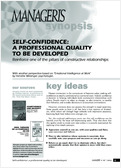
Self-confidence: a professional quality to be developed
Self-confidence is a quality in the workplace, as it helps people build constructive relationships, dare to take risks, etc. So, how to develop and actively maintain your self-assurance?
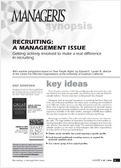
Recruiting: a management issue
Recruiting is an important act of management, which requires real managerial engagement to select the right talent.
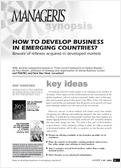
How to develop business in emerging countries?
Companies often stumble when they tackle emerging markets with the reflexes applied on developed markets. Indeed, they must rethink their strategies completely to capitalize on the specific characteristics of emerging markets.

Becoming a top executive: a change in perspective
When taking on a top management position, executives must realize that they need to change their mindset accordingly.
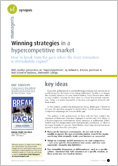
Winning strategies in a hypercompetitive market
How to stand out in a market where the least innovation is immediately copied?

Choose your battles
How can managers give their subordinates the motivation they need to make fundamental changes? By avoiding dispersion and staying focused on a small number of key battles at any one time.

The coaching manager
The most sensitive role of managers is not to tell staff members what to do and how to do it, but to help them change their attitude and behavior.
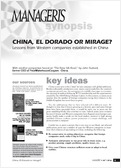
China, El Dorado or mirage?
China seems to have everything to attract foreign investors, but the pitfalls are numerous. What lessons can be learned from the experiences of Western companies that have already gained a foothold in the Middle Kingdom?
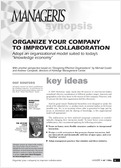
Organize your company to improve collaboration
A growing number of employees today are "knowledge workers." What organization to adopt to facilitate information sharing and cross-boundary collaboration with other parts of the organization?
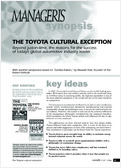
The Toyota cultural exception
How did Toyota take global leadership in the automotive industry? In addition to its "lean" production system, Toyota owes its exceptional success to the specific culture of the group.
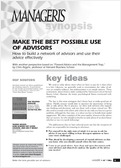
Make the best possible use of advisors
How can you capitalize fully on the recommendations of your network of advisors? Their role is not to make decisions for you, but to help you progress in your thinking.
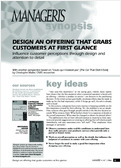
Design an offering that grabs customers at first glance
The first impression has a lasting effect on our opinion. So, companies must know how to influence immediate customer perceptions through careful design and concern for detail.
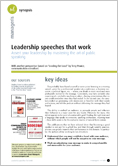
Leadership speeches that work
How can you assert leadership in the art of oratory? Speakers must recognize that emotions play an essential role, in addition to logical arguments.
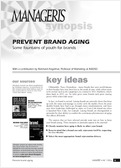
Prevent brand aging
All brands tend to erode over time. However, there are ways to stop this decline and keep a brand eternally young.

Motivational springboards for your workforce
How can you implement an effective retention strategy? Managers play an essential role in motivating a diverse employee population.
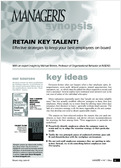
Retain key talent!
The loss of talent is not inevitable, provided a clear, targeted strategy is defined to retain the best elements.
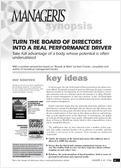
Turn the board of directors into a real performance driver
What best practices can be applied to take full advantage of the board of directors, a team which is too often underexploited?
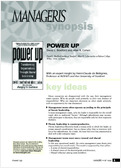
Shared leadership in management teams
What if the traditional leadership model were actually counterproductive? Many suggestions on reinforcing the performance of your management team.
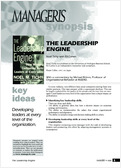
Leaders at every level
What key qualities to promote to foster autonomy and initiative in the field? How to develop leadership skills at all levels of the organization?
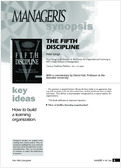
Learning organization disciplines
No position is ever acquired for good. High-performance organizations are able to adapt themselves continuously. What are their secrets?
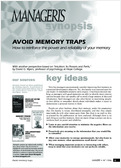
Avoid memory traps
Leaders need to have good memories, but they are still fallible. How to reinforce the power and reliability of memory? By understanding how memory functions, including its weaknesses.
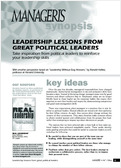
Leadership lessons from great political leaders
How to reinforce your leadership skills by taking inspiration from the methods of great political leaders?
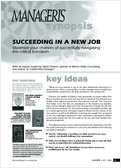
Succeeding in a new job
Taking on new responsibilities is a stimulating challenge, but full of potential traps! How to maximize your chances of making this critical transition successfully?
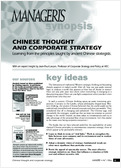
Chinese thought and corporate strategy
The principles behind the thinking of classic Chinese strategists turn out to be surprisingly relevant for coping with today's corporate strategy issues.
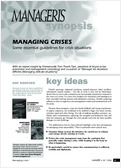
Managing crises
What key principles to apply to avoid making mistakes in extremely destabilizing crisis situations?
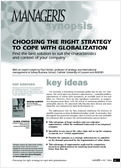
Choosing the right strategy to cope with globalization
Thinking about delocalizing or tackling emerging markets? Depending on their specific characteristics and context, companies have a more or less broad palette of strategies to meet the challenges of globalization.
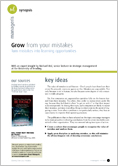
Grow from your mistakes
Companies inevitably make mistakes. By identifying and analyzing their mistakes, companies can turn them into learning opportunities and thus avoid repeating them.
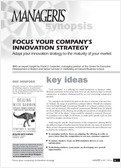
Focus your company's innovation strategy
How to deploy your innovation efforts? The most promising drivers depend on the level of maturity of your market.
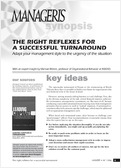
The right reflexes for a successful turnaround
How to emerge from a crisis? The reflexes required to turn a business around may sometimes seem to contradict the habitual principles of good management.
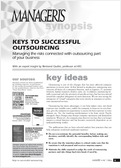
Keys to successful outsourcing
The extended company is an organizational model with many advantages, but also definite risks. How to outsource some of your business functions safely?
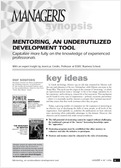
Mentoring, an underutilized development tool
Mentoring means more than educating a spiritual son, but is an excellent means to transmit the knowledge and experience of old hands to the rest of the organization.
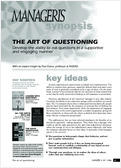
The art of questioning
The most successful managers are more than just persuasive. Asking the right questions is an effective way to get people engaged and help them improve.

Making work more meaningful
How to prevent employee motivation from dropping over time? By giving more meaning to their work.
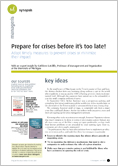
Prepare for crises before it's too late!
Companies often suffer from perfectly predictable crises for which they did absolutely nothing to prepare. What measures to adopt to prevent crises from happening or to reduce their effects?
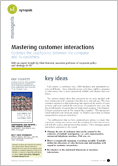
Mastering customer interactions
More than on technologies such as the internet, call centers, CRM tools, etc., customer satisfaction depends essentially on the quality of contact with the company.
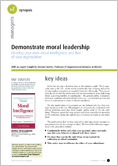
Demonstrate moral leadership
To address the growing call for ethical behavior, managers must not only develop their own moral intelligence, but also be able to influence the behavior of their subordinates.
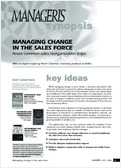
Managing change in the sales forces
Reorganizing sales teams is a sensitive issue, and a particularly difficult task. How to conduct change by managing the risks specific to this context?
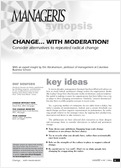
Change… with moderation!
Change management is in vogue. However, too many transformations can have a negative impact on performance. What are the alternatives to radical change?
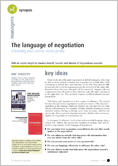
The language of negotiation
What is a good negotiator? It's not just a strategist, but also someone who knows how to use language astutely.
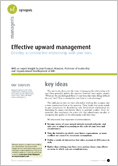
Effective upward management
How to develop a constructive relationship with your hierarchical superior? By basing this relationship on mutual respect, understanding and by seeking areas of complementarity.
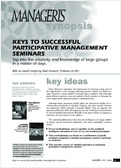
Keys to successful participative management seminars
How to combine the creativity and knowledge of a large group of people in just a few days? Discover a rapid review of participative approaches, such as the Future Search Conference, DesignShop, World Café, etc.
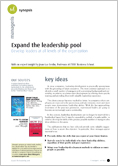
Expand the leadership pool
Why focus leadership training tools exclusively on the limited circle of future leaders? Another approach would be to train a wider group of potential leaders.
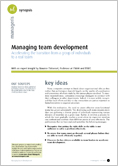
Managing team development
Gathering competent and complementary individuals is not enough to reach a high level of performance. How can you drive such a group to transform into a team?
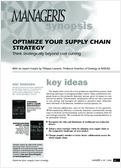
Optimize your supply chain strategy
How to optimize the supply chain? There are viable alternatives to systematic cost cutting.
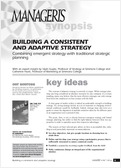
Building a consistent and adaptive strategy
How to develop a strategy which can evolve with the context, without completely giving up on strategic planning as a means to create consistency?
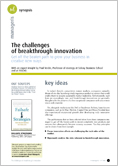
The challenges of breakthrough innovation
By identifying potential growth opportunities off the beaten path, companies can create new markets and acquire lasting leadership. But how to surmount the obstacles?
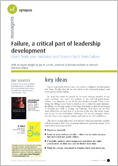
Failure, a critical part of leadership development
Failure is a great learning opportunity, and thus an essential component of leadership development. How can people learn from their mistakes and find the nerve to bounce back?
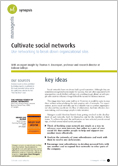
Cultivate social networks
Networking is an effective driver to break down organizational silos. How to build your own network and encourage your subordinates to do so as well?
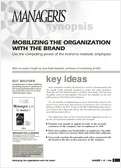
Mobilizing the organization with the brand
The brand is not just an external communication tool, but an active brand policy is also a means to motivate employees as well.
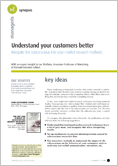
Understand your customers better
Asking customers about their needs and expectations is not enough to understand them. The subconscious also has a considerable impact on buying decisions.
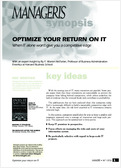
Optimize the profitability of your IT investments
Acquiring a competitive edge with information technologies has become increasingly difficult. In this context, a better approach may be to adopt a cost and risk management approach.
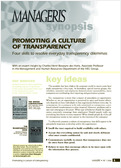
Promoting a culture of transparency
Companies are supposed to be transparent. However, applying this principle is harder than it seems. What skills to develop to resolve the dilemmas of transparency?

Leading cross-functional teams
Cross-boundary teams can help break down organizational silos and reinforce responsiveness. However, coordinating teams that cut across organizational boundaries is a real challenge. What key drivers do employers possess to accomplish this?
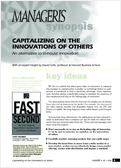
Capitalizing on the innovations of others
Piggy-backing on the inventions of others, by transforming an original concept into a mass market, can be an attractive alternative to pure innovation strategy.
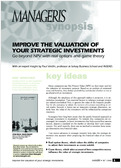
Improve the valuation of your strategic investments
How to get past the limitations of Net Present Value (NPV)? By relying on two advances in strategic research, namely, real option theory and game theory.
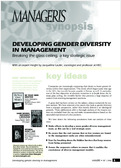
Develop gender diversity in management
How to break through the "glass ceiling?" Top leadership positions will be truly open to women only if all operating practices in the company are completely revisited.
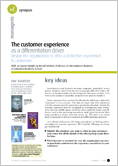
The customer experience as a differentiation driver
The customer experience involves much more than simply using the product. How to set up an organization able to offer a distinctive experience to customers?
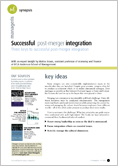
Successful post-merger integration
Three keys to successful post-merger integration: Assert strong leadership, focus on the speed of integration and actively manage the cultural dimension.
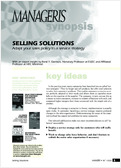
Selling solutions
Selling customized solutions rather than finished products--how to modify the behavior of the sales force to adapt to a service strategy?
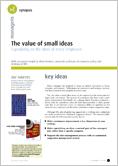
The value of small ideas
Capitalize on the ideas of every employee. How to implement an idea management system that serves as a real performance driver?
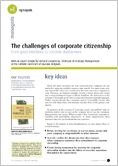
The challenges of corporate citizenship
Although the concept of the socially responsible company is increasingly popular, putting theory into practice is quite a challenge. How to move from good intentions to successful execution?
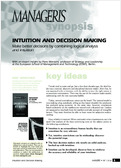
Intuition and decision making
How to combine rational analysis and intuition to make better decisions?
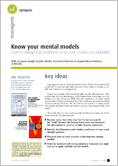
Know your mental models
Our mental models help us understand our environment and make rapid decisions. How can we change our models to become even more creative and agile?
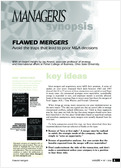
Flawed mergers
Unrealistic assumptions, erroneous analyses… Many projected mergers are doomed to fail from the very start. How to avoid common pitfalls which lead to poor decisions?
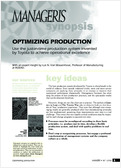
Optimizing production
How to learn from the "lean" production system invented by Toyota to attain operational excellence?
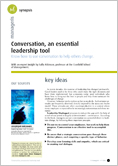
Conversation, an essential leadership tool
The art of conversation is a key driver whose potential is often underutilized, despite its power to cultivate employee autonomy and empowerment.
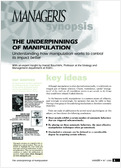
The underpinnings of manipulation
Manipulation is an influence technique commonly used in companies--for better or for worse. Understand the underlying mechanics to manage the impact of manipulation more effectively.
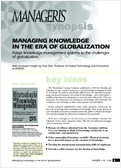
Managing knowledge in the era of globalization
Understand the mechanics of creating knowledge to adapt your organization to the challenges of globalization.
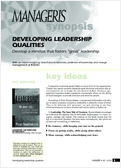
Developing leadership qualities
Peter Koestenbaum invites us to consider leadership as a mindset. Thinking like a great leader requires reconciling apparently contradictory qualities.
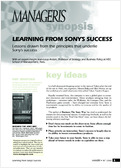
Learning from Sony's success
A small company created in 1946, Sony is now a global electronics and entertainment giant. What lessons can be learned from this success story?
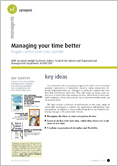
Managing your time better
In an ever-accelerating world, how to take back control of your agenda? What if the solution were actually to do less in order to perform critical tasks better?
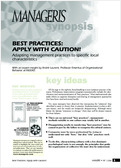
Best practices: apply with caution!
Many supposedly universal "best practices" are very difficult to transpose from one country to another. How to adapt your management practices to specific local characteristics?
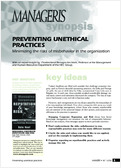
Preventing unethical practices
How to minimize the risks of unethical behavior in the organization. Many ethical slips are due less to actual dishonesty than poor information management.
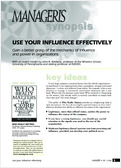
Use your influence effectively
An original slant on the mechanics of power and influence in business organizations.
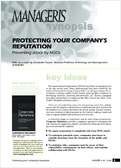
Protecting your company's reputation
A number of the world's leading companies have been taken aback following unexpected attacks by NGO. How to keep this from happening to your organization and optimize your relations with NGO?
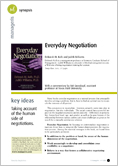
The human side of negotiations
Negotiating successfully takes more than just reconciling different interests. Considering the human dimension when negotiating considerably increases the chances of success.
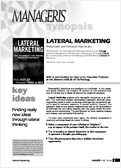
Lateral thinking and marketing innovation
How to introduce more creativity into innovation and invent new markets? Lateral thinking is a way to move away from the beaten path.
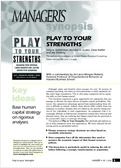
Manage your human capital
Human capital is the only cost item whose profitability is rarely measured with precision. How to base your human resource strategy on rigorous analysis?
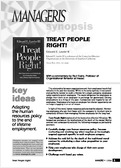
The new employer-employee contract
The moral contract which used to oblige employers to offer lifetime employment is now a thing of the past. How to adapt the human resource policy to the new environment?
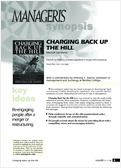
Get people reengaged after restructuring
How to mobilize people after a merger or restructuring? Although the psychological shock is inevitable, leaders have ways to help people turn the page.
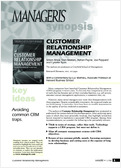
Avoid the pitfalls of CRM
How to avoid the pitfalls of CRM to capitalize on the full potential of tailored customer relationships?
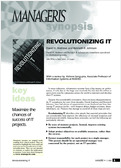
Conduct successful IT projects
Despite heavy investments, few IT projects live up to their promises. How to avoid falling into common IT traps to maximize the chances for success?
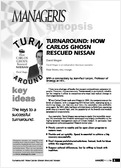
The Nissan turnaround
What principles did Carlos Ghosn use to achieve Nissan's spectacular turnaround? A shining example for any leader faced with the challenge of changing an organization rapidly.
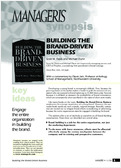
Build a brand culture in your organization
People often consider that brand building is the job of the marketing or communication department. How to develop a brand culture that engages the entire organization?
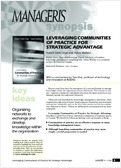
Deploy communities of practice
How to organize knowledge sharing and creation networks within the organization? Learn from the example of Clarica, a Canadian insurance company.
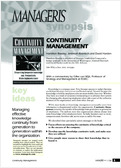
Protect knowledge despite staff turnover
In an era where employee turnover has increased spectacularly, how to ensure the transmission of knowledge across generations?
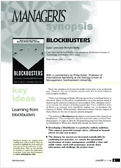
Lessons learned from blockbuster products
Among the hundreds of products launched every year, very few become real blockbusters. What practices can be used to increase the chances of spectacular success?
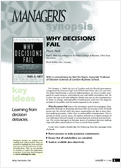
What can we learn from bad decisions?
Most bad decisions are attributable to inherent defects in the decision-making process itself. How to become aware of common decision-making traps in order to avoid them?
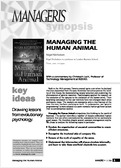
Ancestral instincts and behavior in the workplace
In the era of information technologies, our brains still function like they did in the Stone Age! Inspired by evolutionary psychology, this book sheds interesting light on organizational behavior.
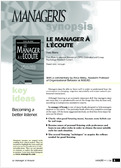
The ability to listen as a key managerial skill
In today's business environment, employees expect managers to listen attentively. How to develop good listening skills?
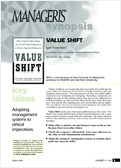
Choose your ethical positioning
Good ethical conduct is a now obligatory. But what kinds of commitments should companies make? And how to adapt management systems to ensure compliance with ethical commitments?
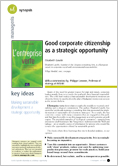
Good corporate citizenship as a strategic opportunity
Companies often consider their ecological and social commitments as constraints. How to turn them into strategic opportunities?
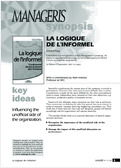
Decipher the unofficial side of the organization
The functioning of companies is not only dictated by official rules but also through informal phenomena. How can you take this into account in the management of the organization?
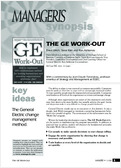
The General Electric method to instill change
The method used by Jack Welch to make General Electric one of the world's most responsive companies, by betting on the development of employee leadership skills.
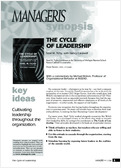
The leader as developer of future leaders
The presence of leaders at all levels is a major asset to ensure organizational agility. But how to develop these leadership skills?
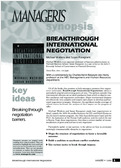
Avoid reaching an impasse in negotiations
How to conclude a negotiation which appears to be heading for an impasse? Diplomatic negotiations can serve as enlightening examples.
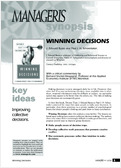
Avoid collective decision-making traps
Paradoxically, teams sometimes make worse decisions than the individuals composing them would have made on their own. How can you improve the collective decision-making process?
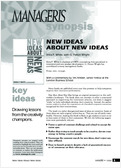
Creative ideas about creativity
How to develop creativity in your organization? Lessons learned from one hundred business leaders recognized for their creativity.
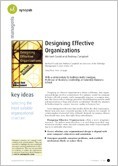
Choose the right organizational structure
Defining the organization is always a dilemma. Rather than aiming for an ideal model, companies should rather opt for a structure that is best suited to their particular constraints and priorities.
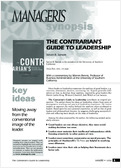
Dispelling some common myths about leadership
Leaders are generally considered as firm decision-makers, with a strong vision and firmly-established convictions. Wouldn't it be judicious to dispel this conventional image?
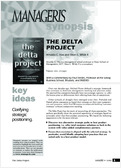
Clarify your strategic positioning
On what basis should you define your strategic positioning? This book puts the various approaches developed over the past two decades into perspective.
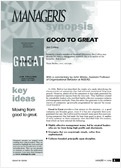
How to achieve excellence
How to move your performance from average to exceptional? Companies that excel tend to share certain distinctive features.
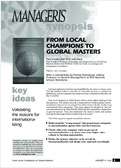
Should you go global?
What are the right reasons to go global? What are the potential advantages? Design your globalization approach based on your primary objectives.
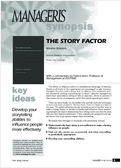
Develop your storytelling skills
How to improve the ability to influence others? One original approach is to develop the ability to tell compelling stories.
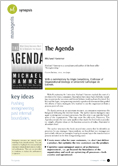
Reengineering beyond the borders of the company
How to push the envelope on reengineering? By expanding process improvement past the borders of the company in order to create more value for customers.
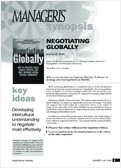
International negotiation
Negotiation practices are not as universal as people tend to believe. In fact, it is important to know how to adapt your behavior to the cultural context of the counterpart.
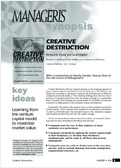
Creative destruction at the service of growth
Company performance is often held back by the natural tendency to focus on business continuity. How to learn from the venture capital model to combat this tendency?
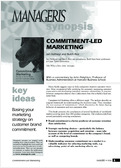
Customer retention and brand attachment
Customer loyalty is not always linked to their satisfaction. How to base your marketing policy on customer brand attachment?
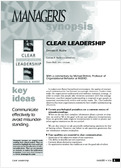
Communicate clearly with others
Communicate clearly with your surroundings is an essential driver to the quality of interpersonal relationships. How to communicate effectively to avoid misunderstandings?
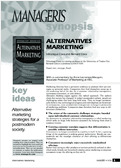
Marketing in the wake of sociological upheaval
In the wake of sweeping sociological changes, traditional marketing theories are obsolete. What new ways are available for companies to differentiate themselves?
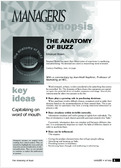
Capitalize on word of mouth
Word of mouth can be a very powerful marketing tool, provided that a company is able to influence it in a favorable direction.
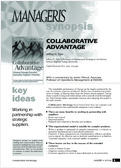
Supplier or partner?
Establishing partnerships with your strategic suppliers can be a source of decisive strategic advantage.
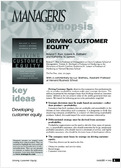
Manage your customer equity
Product profitability analyses often lead to poor decisions. Wouldn't it be better to focus strategic thinking on customer equity?
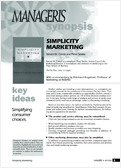
Return to simplicity
Consumers today are increasingly stressed by an offering that is more and more complex. What if the answer were to return to simplicity?
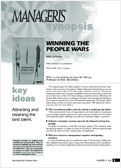
Win the talent war
In a tightening labor market, how to attract promising talent and reinforce the retention of existing talent?
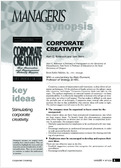
Develop a creative culture
"Creativity techniques" do not take sufficient account of the unpredictable nature of creativity. A better idea is to develop an atmosphere conducive to the emergence of creative ideas.
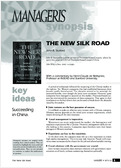
Succeed in China
As China's economy becomes more open, what are the keys to gain a successful foothold in China?
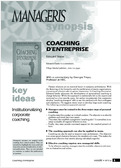
Institutionalize coaching in your organization
How to institutionalize coaching throughout the company, on both an individual and collective level?
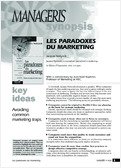
The traps of marketing
How to avoid certain traps into which marketing practitioners too often tend to fall?
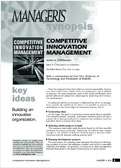
Manage innovation
How to organize management systems to improve your ability to innovate and turn this into a lasting competitive advantage?
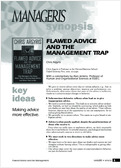
Why do we give and get so much bad advice?
The advice that we are spontaneously led to give in a business organization is often of little relevance. How can we improve on the effectiveness of our advice?
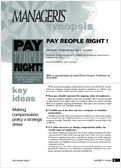
Define your compensation policy
How to make your compensation policy a key strategic implementation driver?
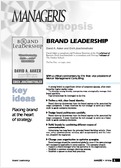
Building strong brands
A strategic brand management platform and practical advice.
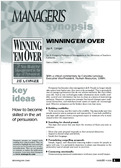
Use persuasive techniques to obtain adhesion
Managers today need more than just good ideas; they must also be able to convince people. How to develop your powers of persuasion?
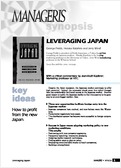
Japan, land of opportunity
Japan today offers many opportunities for foreign companies. How to capitalize on this new market?
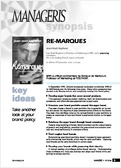
New brand policies
How to adapt your brand policy to new economic and competitive imperatives?
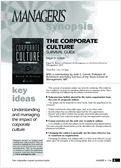
Deciphering the company culture
Company culture is a concept that is often difficult to grasp. How can you define company culture—and adapt yours when necessary?
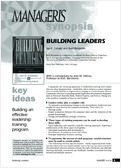
Leadership development programs
The characteristics and key success factors for high-performance leadership development programs.
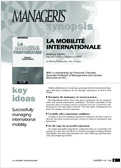
International mobility
As markets become more global, companies have a growing need for internationally mobile managers. How to select potential expatriation candidates and maximize their chances of success?
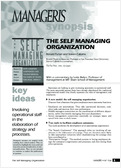
The participative organization
The "search conference" and "participative design" are two tools to foster the autonomy of operational staff by involving them in developing strategy and designing the organization.
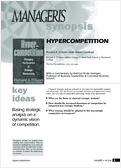
Strategy in the era of hypercompetition
There is no such thing as lasting competitive avantage. What strategic skills are required to help businesses adapt continuously to a shifting competitive environment?
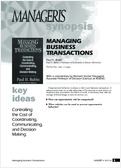
Opportunism and contracts
Assymetrical information, exploitative use of warranties, conflicts of interest, etc. How to protect yourself from opportunisic behavior in business relations?
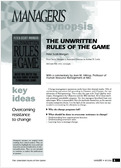
Deciper the unofficial rules that obstruct change
Many "unofficial rules" govern the way companies operate. What is the impact of these rules? How to integrate this impact when implementing a change project?
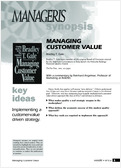
Added value, perceived value
Success depends on the ability to create value perceived by customers as superior to the competition's. How to manage the value of your products and services?
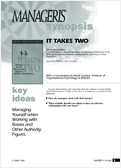
The keys to hierarchical relationships
The ability to manage the relationship with superiors is critical for managers to perform well and advance in the organization. What key drivers can be used to hone this ability?
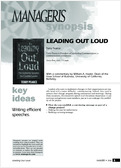
Build a compelling speech
How to build the various parts of a speech, how to communicate at meetings, how to build your credibility, how to convey messages effectively to convince your audience?
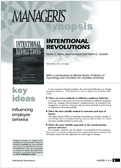
Change attitudes and behaviors
In any change program, a major challenge is to change behavior. What are the different possible methods and the prerequisites to implement them successfully?
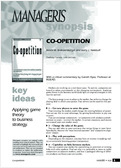
Coopetition, between cooperation and competition
New competitive strategy approaches have been developed by applying game theory to corporate strategy . Some interesting leads to explore?
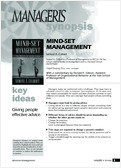
Help your employees change
How to help employees challenge attitudes or behavior which may be holding them back?
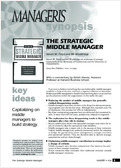
The strategic role of middle management
Many companies have pared their middle management ranks down to the minimum. But what if middle managers play a key role in developing and executing strategy?
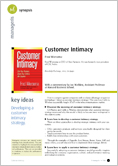
Customer intimacy
The ability to offer solutions that are perfectly adapted to the needs of individual customers can procure a sustained competitive advantage for a business. How to go about this?
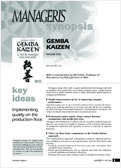
Gemba Kaizen and continuous improvement
How to use the Japanese "kaizen" approach to implement continuous quality improvement on the production line?
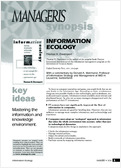
Master and manage knowledge and information in your business
How to manage knowledge and information more effectively in your organization? Read about the risks of an overly-technical approach and the keys to true information management.
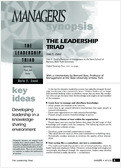
Leadership and knowledge sharing
Knowledge has become a key competitive factor. How to rethink leadership to promote the sharing of knowledge in the organization?
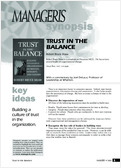
The keys to trust
Trust helps promote empowerment, information sharing and cooperation. How to create a trusting culture within the organization?
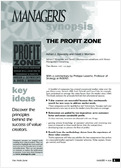
Identify and target the profit zones in your market
What are the keys to the success of value creation champions? One key is their ability to reinvent the rules of their industry continuously.
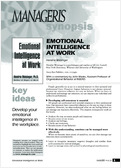
Control your emotions to make them an asset
How to understand and manage your emotions to capitalize fully on their power rather than be penalized by them.
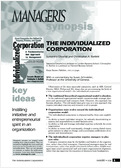
Focusing your organization on the individual
How to develop individual initiative and entrepreneurial spirit in a vast organization?

From heroic to authentic leadership
The observation of sustainably successful leaders highlights a reality that is clearly different from the fantasized figure of the conquering hero. How can we become aware of this gap between the fantasy and the reality to develop our leadership qualities?

Turbulence and strategy
Devising relevant strategies in a turbulent context is a tricky job for business leaders, as traditional points of reference for making strategic decisions may no longer be valid. How to take a fresh look at strategy in this new market context?

Foster disruptive innovation
Game-changing innovations frequently dethrone incumbent players… However, there are many potential pitfalls along the way. How to overcome these challenges?

Develop your emotional intelligence
Everyone knows today that EQ is an essential factor in performance. Even so, emotional intelligence often remains an abstract concept. How can it be developed?

Grasp the invisible dynamics of the organization
Organizations often have a life of their own, whatever the efforts of their leaders to control it. How can you decode organizational dynamics to better influence them?

Diversify career management
The working world has changed. Flexibility and personalization are the new watchwords in career management. How can you adapt career paths for increasingly diverse employee profiles?

Learn by experience
Conventional training, whether educational or continuous, only accounts for 10% of leaders’ learnings. They learn most from field experience. How can we make the most of such experience?

The essence of management
Managers are responsible for results which they don't produce themselves. They actually depend on their subordinates. How can they optimize the performance of their teams?

Foster cooperation across organizational boundaries
Rather than a question of ill will or indiscipline, lack of cooperation is often a result of the need for belonging that governs our interpersonal relationships. How can we take this into account to boost collaboration?

Escape the time trap
Running increasingly faster seems to be everyone’s challenge. How much of this feeling of constant overload relates to perception, and how much is actual reality? How can you liberate your agenda from self-inflicted constraints?

From training to action
Despite investing heavily in training, companies are often disappointed with the results. How to ensure that people make changes in their everyday work as a result of the training they receive?

The intuitive leader
Our focus on logical reasoning has diminished our appreciation for the importance of emotions and intuition. Yet, intuition can be extremely powerful, provided you don't trust it blindly. How to make your intuition more reliable?

Managing teleworkers
Modern technology has made teleworking easier than ever before. How to adapt management practices to capitalize fully on these opportunities while preserving the quality of teamwork?

Evaluate your employees to enhance their performance
How can you conduct annual performance interviews to motivate people to develop their skills while boosting their short-term performance?

Ensure consistently high-quality customer interactions
The quality of the perceived customer experience depends heavily on the interaction of the customer with a given employee in the field. How to build a collective sense of quality of service in your organization?

Adaptive leadership, a key to sustainable performance
There is no magic formula in management. It's the ability to adapt that makes the difference. How to adjust one's management style to the demands of the situation?

Happiness, a powerful performance driver
Happiness is not the consequence of success. Research in neuroscience shows rather the opposite: happiness is a success factor! How can we improve performance by cultivating happiness?

Cultivate your creative potential
"Agile" companies need inventive leaders and employees. This said, one needs not possess an innate gift for creativity to be an innovator. How can we evolve our mindset to develop our own creative capabilities?

Leader 2.0
The information revolution affects more than processes; it also changes people. How can you adapt management to this new environment?

Inspire trust
Trust is a key ingredient of high-performance teams and organizations. How can we develop a good understanding of its different components to foster its emergence and maintain it to last?

Create a culture of accountability
Our defensive reflexes cause us to hold onto old habits, and thus obstruct change. How can we address issues in a more constructive and responsible manner?

Learn to manage the constantly rising flood of information
The human brain is an extraordinary machine for storing and applying information. Could companies learn from how it operates to manage an exponentially growing volume of data more effectively?

Stimulate job satisfaction
A recent study shows that energy at work primarily feeds on the conviction that we can progress effectively. How can we use this lever to optimize resources by reinforcing staff work satisfaction?

Foster your staff’s self-fulfillment
In theory, work represents a major opportunity for personal fulfillment—but the reality is often less gratifying. How can the line manager contribute to helping to rekindle this fulfilling dimension of work?

From ideas to action
In every business organization, hundreds of ideas are generated every day, ranging from creative solutions to everyday problems to revolutionary new products and services. What if innovation were principally a question of personal discipline?

Reconnect with your ingenuity to boost your capacity for innovation
After being long considered as players with low added value, emerging countries are now showing a surprising ability to innovate. What can be learned from their innovation approach?

Take action despite uncertainty
The duration and extent of the economic crisis makes it difficult for business to know where to turn and what to do. Indeed, how do you find the right balance between prudence and audacity to continue moving forward?

Luck, a skill to be developed
Without being intrinsically lucky, some people spontaneously do things that make good things happen to them. So what behaviors are conducive to luck, and how to implement them to develop what is actually a real skill?

Channel your intuition
Our intuition is an astonishing and valuable tool that is always in movement. Subjected to many biases, it may however easily lead us into error. How can we limit this risk to make the most of intuitive thinking?

Strengthen the appeal of your new products
Convincing consumers to change their routine and try something new is not easy! Yet, some new products and services manage to become blockbusters. What fixations guide those who have accomplished this feat?

Rethink leadership
Faced with the challenges and constraints of the 21st century, managers have to adjust their roles and attitudes. How to adapt leadership to the demands of the working world of the future?

Participative management in the 2.0 era
In times of free exchanges in discussion forums and instantaneous information flow through social networks and Twitter, traditional intra-company communication channels look archaic. How can one foster a real conversation between an organization and its employees?

Innovate through experimentation
Experimentation is a powerful innovation accelerator which, thanks to the digital revolution, is much more accessible than before. Yet it remains under-utilized. How can you prompt people to acquire the reflex to experiment with their ideas?

Harness the power of habit to manage change successfully
Many change projects fail because people return to their former behavioral patterns. Yet this is not inevitable: how can one use habit as a supportive—rather than obstructive—change management driver?

Move beyond the work-life balance dilemma
What if finding the right balance between personal and professional life is the wrong question? Recognizing that the two are constantly intermingled makes it possible to move beyond this contrast and to find a new equilibrium.

Choosing the right leaders in turbulent times
How can one choose future leaders, who will renew the business without alienating its identity? Rather than defining an ideal profile, mixing various styles and experiences is the best way to face today's and tomorrow's challenges.

Define an effective resource strategy
Make or buy? This question is central to strategic analysis. Yet, the way it is formulated is outdated: today, it is often more effective to borrow resources. What are the recipes to succeed at this strategy?

Subconscious roots of purchasing decisions
We are used to see humans as rational beings. Yet, most human behavior is managed automatically by the brain, without mobilizing reason. Can this be used to reinforce the effectiveness of your marketing efforts?

Turn your customers into brand ambassadors
Some firms manage to rely on service excellence to turn their customers into ambassadors for their products and services. How to make customer experience a key success factor?

Create buzz around your offering
Buzz has always existed, but this phenomenon is amplified today due to social networks. In light of recent studies, what are the key actions to support word of mouth around an offering?

Rally the entire workforce for effective change management
What is the secret of the exemplary success of some (too few) transformation programs? Discover how to rally the energies of the whole workforce in order to manage change effectively.

Managing managers: Find ways to add more personal value
Managing multi-tiered teams takes much more than a simple quantitative adjustment. An entirely new rapport must be created with the organization to add value in the new role.

Integrate the human factor to improve project management
The reason why so many projects fail lies less in disciplined project management than in the irrational dimension that influences day-to-day action. How can we integrate this human factor?

Transparency challenges
Anticipating expectations of company stakeholders with regard to information can bring considerable benefits. How to develop a culture of transparency?

Cultivate and maintain your network
Networks can be a real performance driver if they are carefully cultivated and maintained. Building an effective network hence requires methodical efforts that anyone can undertake.

Work on your authority
If the focus is today on cooperation, autority still remains an essential ingredient of performance. How can you develop your power and leadership to maximize the value you bring to the organization?

Create the markets of tomorrow
Radical innovations do not simply improve upon the existing; they transform the market by offering radically new applications. What approach can you adopt to imagine such disruptions?

Successfully conduct your Lean Management approach
Adopting a Lean Management approach bestows a major competitive edge to some companies… and brings disillusionment to other ones! What are the key drivers to instill the Lean approach successfully?

Combine economic and social performance
In the current economic crisis, social responsibility or environmental performance issues are often relegated to the background. How can businesses turn CSR into a source of strategic innovation and creation of economic value?

Attention, key to performance
Better managing our time is not the only way to increase effectiveness. Our capacity to pay attention and concentrate also has a major impact on performance. How can we develop this ability to focus?

The keys to a successful job transition
Job transition is a hazardous moment. Especially, care must be taken not to rely too much on past strengths, as the new role may require new attitudes. How to make this transition successfully?

Be a motivating manager
Motivation has a direct impact on people’s performance. But how can it be sustained? The attitude of superiors has a decisive influence on the satisfaction that people derive from their work, and by extension, on their motivation.

Build an effective board of directors
Some boards of directors have been able to go beyond their traditional supervisory role to position themselves as true partners working with operational leaders to boost company performance. How did they go about this?

Revitalize your strategy
To stay afloat facing accelerating competitive shifts, businesses must regularly regenerate their strategies. But how can they reinvent themselves while so many forces support organizational continuity?

Disseminating your best practices
How to spread a technique that has proven successful locally to the entire organization? The answer can be learned from the example of companies that have successfully disseminated their know-how.

Boosting efficiency: new opportunities to explore
Is it still possible to gain in efficiency when everything has already been tried? In a complex environment where traditional methods prove counterproductive, other drivers must be found.

Ask questions to engage people
The culture of asking questions is not very widespread in corporate circles. Yet, it is an invaluable driver of engagement and progress. How can we get the most out of it to mobilize energies?

Encourage cooperation
Cooperation between teams is a key driver of agility, but it is not easy to establish. How can we create the conditions to get people to want to invest in the collective game?

Change management: The new deal
Nowadays, change no longer consists in moving organizations from a stable starting point to a stable target point. How can we revisit change management best practices to take into account this reality?

Taking a job abroad
A move abroad constitutes a challenging time. Cultural differences, especially, are manifested in a more complex way than foreseen. How can one decipher their impact more effectively to succeed in this job transition?

The art of the pitch
The ability to sell your ideas and projects is a key success factor. But how can you capture the attention of your audience? Beyond the mastery of argumentation, discover the fundamentals of effective pitches.

Support customer orientation in the field
The least qualified employees are often the ones in direct contact with customers—with a major impact on the perceived quality of service. How can you develop customer satisfaction through the engagement of your front-line employees?

Surround yourself with the best
50 to 70% of recruiting decisions turn out to be unsatisfactory. Yet it is possible to do significantly better, for recruiting can be learned. What lessons can we draw from the experience of recruiting professionals?

How can you act as a leader in an uncertain world?
In a context of chronic uncertainty, the image of the bold visionary is obsolete. How can we rethink leadership to regain the ability to set a compelling course and organize our action coherently?

The future of marketing
The Internet has dramatically changed the way consumers make buying decisions. In the age of the web consumer, what are the new influence drivers marketing can use?

Big Data: Making the most of the revolution
Beyond the capacity to process gigantic volumes of data, Big Data creates opportunities that are still largely untapped. How can you take advantage of this huge field of innovation?

The new innovation leader
Innovation is often seen as the work of a visionary genius. Yet, other innovation leadership models exist that are more accessible. How can leaders create an environment conducive to the creativity of their teams?

Make the digital transformation in time
The few companies that have been able to take full advantage of digital technologies show exceptional profitability ratios. How can you take inspiration from the practices of these digital champions?

Develop your resiliency
In companies focused on agility, leaders are torn between expectations for clear-cut decisions and the necessity to adapt to changing conditions. In this context, how can they move forward without burning out?

Retain your lucidity despite the isolation of leadership
Retaining a sense of lucidity about ourselves and the situations we manage is all the more difficult when we are in a leadership position. So how can we preserve our capacity for judgment?

Cultivate your charisma
Charisma essentially stems from our ability to communicate beyond words—through our posture, gestures, eye contact, etc. How can we develop this key factor of influence?

Intrapreneurship: A growth vector to explore
Is the entrepreneurial spirit only for start-ups? In established businesses, the capacity of employees to support innovation is often stifled. How can you help intrapreneurs reveal themselves in your organization?

Negotiate with agility
Far from being restricted to a balance between well-established forces, negotiation is a process highly subject to uncertainty. How can you maximize your chances of success by developing your ability to adapt to the unexpected?

From manager to leader
High-performing managers are sometimes surprised when they don’t get a promotion or are evaluated below their expectations. Indeed, even in operational positions, managers must demonstrate leadership qualities such as strategic perspective, the ability to influence others and to lead change.

Take inspiration from agile project management methods
Well-suited to complex environments, so-called “agile” project management methods are increasingly popular. What are the conditions required to reap the full benefits of the agile approach?

Differentiate yourself in saturated markets
On saturated markets, competitors generally fight on commercial presence and price. Yet, there are other ways for businesses to differentiate themselves. How can you play on services and positioning to gain a competitive edge?

Preserve critical know-how
A large part of a company’s strengths resides in the tacit know-how of many individuals. This know-how is not easy to identify and formalize. How can you avoid losing this invaluable capital?

Really know your customers
Surveys conducted by companies to know their customers better often result in failures in launching or improving their products and services. How can you make customer surveys more reliable?

Aim for excellence in your managerial practices
How can you find the right combination from the various components that constitute the quality of managerial practices? Following Google’s example, you can take inspiration from methods used in operational excellence and experimental science.

Take responsibility for change
To make things change, we have a lot more leeway than we think. How can we take responsibility for creating the changes we want to see implemented?

Secure your strategic decisions
Many decision-making errors derive from reflexes that lead to form a truncated view of reality. How can we avoid this risk? By engaging in debate that allows us to confront different viewpoints.

Break down organizational silos
“Siloed” organizations, which used to be highly effective, prove less relevant in today’s complex environments. How can we avoid the downside of an organizational model in which we had previously found so many qualities?

Feed your creative spark
Brilliant insights often spring to mind unexpectedly. These “Eureka moments” don’t happen by chance and aren’t the exclusive reserve of a few creative geniuses. How can we create the conditions for this creative spark to arise?

The holacratic company: beyond the utopia
The concept of the holacratic company attempts to give employees a maximum of autonomy by eliminating the constraints which hobble initiative. What underlies the success of organizations which have adopted this management approach?

Introverts and extraverts: How to cooperate better together
Far from being respectively a virtue and a fault, extraversion and introversion are two personality poles that both have their assets and limits. How can we turn these differences into a key to collective performance?

Collaborate… but not too much!
In today’s working environment that favors teamwork, concentrating has become a challenge. It is nonetheless a factor of productivity and well-being. How can you give everyone the possibility to secure periods of real concentration?

Grab attention… and keep it!
In the era of infobesity and chronic distraction, how can you grab the attention of your audience and retain it over time? Understanding the psychological and cognitive underpinnings of attention is invaluable to achieve this goal.

Make use of everyone’s talents
Each of us has specific talents that enable us to excel in certain activities. How can you organize yourself to identify the individual qualities of your team members and build on them?

Develop the employability of your staff members
In today’s world, employees seek an environment that enables them to develop their competencies and continuously enhance their employability. How best to respond to this demand?

Successfully transitioning to the self-managed enterprise
While the ”liberated company” model provides a solution to agility challenges, it involves a real disruption in organizing the relationships among employees. What does it take to achieve such a radical change?

Differentiate through corporate identity
To differentiate a company in saturated markets, its project, convictions and culture are increasingly important. How can you promote them in a compelling and credible manner?

Managers as motivation facilitators
Motivating employees is an arduous task, particularly since people cannot be motivated against their will. So, how can you help your team members be proactive in finding their own intrinsic motivators?

Get the most from your consultants
Businesses increasingly rely upon outside consultants, but are often disappointed with inconclusive results or difficult-to-manage relationships. How can you make the most of your consultants?

Develop charisma and presence
Self-confidence is indispensable to inspiring trust. But it is seriously challenged by the daily life of an organization… How can you be seen as more credible, more authentic and more convincing?

Base your strategy on your distinctive capabilities
The race for competitive advantage often leads to endless escalation. How can you break this cycle? One solution is to refocus your strategy on the specific capabilities that strongly differentiate your company.

Matters of conscience at the heart of management
How to choose between different options when none of them clearly emerges as being the best? These dilemmas make us face ourselves: What is most important for us? What do we favor? What image of ourselves do we give others?

The art of negotiation: A delicate balance
Negotiations are not just power struggles. The most beneficial agreements are obtained by also seeking ways to best respond to the interests of the other party. How can you manage this delicate balance?

The illusion of objectivity
Reflexive thinking is indispensable to react and make decisions efficiently, but may also distort our perception and ossify our way of thinking. How can we avoid being trapped in our cognitive illusions?

Promote leadership values
Many companies seek to develop leadership by focusing their communication on strong values. But these are often at odds with the reality in the field. How can you promote leadership values in a credible way?

Collaborate with your customers
While the digital revolution has given consumers the possibility to involve themselves in the life of companies, very few businesses actually take advantage of this opportunity. How can you transform your consumers into privileged partners?

The new era of analytical marketing
The recent technological disruptions have deeply modified the value creation methods in businesses. What are the growth opportunities deriving from analytical marketing, and how can you organize to succeed in this transition?

Feedback, an uncomfortable but invaluable exercise
Feedback is often an uncomfortable exercise both for those who give it and those who receive it. Yet, it almost always brings useful insights. How can we derive greater benefit from the feedback we receive?

Boost the involvement of your teams
Teamwork is not always a guarantee of effectiveness. Yet there are companies where the team members pull each other towards the top. How can you use these experiences to develop teams that are deeply involved and in search of excellence?

Increase the resilience of your organization
All organizations are confronted with the risk of crises. Rather than vainly attempting to avoid them, you had better develop the capability to absorb them and to learn the lessons. How can you acquire and cultivate resilience?

Implementing a successful reorganization
In a context of permanent change, companies need to reorganize frequently—but results are rarely satisfying. How can you maximize your chances of success in a reorganization initiative?

Turn failure into a springboard
Company leaders generally perceive failure as a setback rather than a means to learn and improve. How can you make use of your failures—and help your employees do the same?

Improve the creative dynamic in your teams
Team creativity largely depends on the ability to build on the ideas of others. How can you draw on theatrical improvisation techniques to optimize the quality of creative discussions?

Combine efficiency and benevolence
It is possible for managers to reconcile efficiency and benevolence. But between performance imperatives and employee fulfillment at work, the dosage is subtle. How can you find and maintain the right balance?

Employees 3.0: how to manage them?
The digital revolution has fundamentally changed staff members’ expectations: less formal and more personalized relationships, greater flexibility in career choices… How can you evolve your HR management accordingly?

Reinforce the company culture
Companies with a strong culture perform better over time than their competitors. But what is meant by company culture? And how can you turn it into an asset to mobilize your teams?

Online communities: How can we develop their value?
Employee, customer or expert communities are a real asset for companies. However, for them to succeed, the organization must involve itself—to a certain extent. How can we create the conditions for such a dynamic?

Co-design: Knowing how to dialogue
In a digital era that forces us to be more agile, open and cooperative, the aptitude for dialogue is an essential condition to innovate and adapt. How can you develop your ability to hold constructive team discussions?

Joining the leadership team—what are the stakes?
Being appointed to a senior executive position or entering the executive committee sounds like a consecration. But the transition often proves much more difficult than imagined. How can you prepare for this major change?

Improve your personal productivity
Paradoxically, the productivity of business organizations has decreased over the past few years. Thus, our tendency to confuse being busy with being productive leads us to waste 25 to 40% of our working time. How can we gain back these lost hours?

Neuroscience and change
Our brain likes habits. To the extent of being opposed to any change? In reality, neuroscience demonstrates that we can adapt our practices in change management to the functioning of our brain.

Dare to express your views
Paradoxically, in a business world branded as tough, managers often have a hard time expressing clearly what must be told. It is because this requires a self-confidence that is not always well established. How can you develop this quality?

Artificial intelligence: beyond the buzz, a major challenge
Today, artificial intelligence offers huge potential, while raising as many hopes as fears. Indeed, while the gains are undeniable, implementation is not straightforward. What conditions are required to take advantage of AI?

Contradictions, a source of innovation?
Great leaders are able to surmount apparent contradictions to devise original solutions that bridge the two initial options. How can you draw inspiration from their example to turn dilemmas into a source of creativity?

Gaining in eloquence
Presenting ideas verbally is never an easy task. Beyond solid arguments, speaking the right way is necessary to catch the attention of an audience, and push them to take action. How can you maximize the impact of your spoken message?

A more powerful memory
Having a good memory is an undeniable advantage; it helps reinforce influence, and attract credibility and respect. Luckily, memory is not an innate capability: with some technique, you can train it. How can you develop your memory?

Networking: a competency that needs developing
A good network is a recognized factor of professional success. To develop it, an approach that is methodical and targeted is more productive than one that is empirical. How can you build a useful network without incommensurate effort?

Do you make a good impression?
We do not all have the same innate level of charisma. Yet, we can identify the factors that influence the perception others have of us. How can we take advantage of this to ensure we make a good impression?

Addressing the quest for meaning
The issue of meaningfulness has today become a determinant in the life of business organizations. How can we identify our raison d’être and that of our companies—and transform this into an individual and collective performance engine?

Managing emotions during a negotiation
Emotions play a major role in the course of a negotiation. How can we learn from recent research in behavioral psychology and neuroscience to take advantage of these emotions, rather than suffering from them?

Optimizing employee experience
An increasing number of companies are working towards treating their employees as well as they treat their clients. How can you rely on employee experience to develop your company’s performance and attractiveness?

Liberating the company: returns of experience
The notion of liberated company remains controversial: some see in it an ideal model, others a deception. In any event, it raises a key question: how can you combine individual autonomy and collective efficiency?

The art of creating memorable moments
What makes some moments more memorable than others? Discover the cognitive mechanisms behind those special moments: you will then know how to orchestrate them for your clients and staff.

Sharpening our self-awareness
Self-awareness is a determining factor in professional success. It is also a complex and intimate topic. How can we develop the means to function with a better understanding of ourselves?

Own your position as a manager-coach
Most managers tend to focus more on operational matters than on the development of their staff. Beyond a scheduling issue, it is more a matter of personal stance. How can you be an effective manager-coach?

Evolving towards circular economy
“Extract – produce – dispose”: against this linear economic model, nowadays reaching its limits, a new model is emerging. Circular, it aims at minimizing, regenerating and recycling the resources. Why and how to initiate this transition?

The traps in team dynamics
Theoretically, a team performs better than isolated individuals do. However, these team dynamics are vulnerable to pernicious effects. How can you rely on the psychology of groups to counter these drifts?

Successfully implementing telework
Remote work presents clear benefits for both staff members and employers. But this organizational model presents many challenges for managers. How can you adapt your style of management to really take advantage of remote work?

Dealing with a “difficult” boss
What can you do when faced with a “difficult” boss? Rather than enduring him/her, you should rather seek to modify your relationship with him/her. By understanding the underlying triggers behind your hierarchical superior’s stance, how can you influence his/her attitude and behaviors?

Implementing Design Thinking
Based on proximity to the end user, on pragmatism and agility, Design Thinking promises to boost innovation. But this method can prove demanding to implement. How can you make the best possible use of it in your organization?

Addressing the upheavals of the global markets
The globalized organization is generally considered to be a reference model. Yet, distance remains a real obstacle, all the more so since this model is today confronted with several disruptions. How can you rethink your performance levers on international markets?

Thinking differently
We all have a natural preference for what is familiar to us. Yet, to adapt to circumstances, companies and their staff must constantly reinvent themselves, which requires that they get out of their usual thinking patterns. How can you nurture this healthy habit?

Driving change
Among all the factors that contribute to the success or failure of transformation initiatives, the attitude of staff towards change is absolutely decisive. How can you convince them to engage in the effort towards transformation?

Reaching an executive management position
Becoming a senior executive does not only involve taking on extended responsibilities: the conditions of success are often different from what we expected. How can you best prepare for these new demands?

Adapting in the age of on-demand talent
Nowadays, as self-employment experiences a new surge, companies must adjust to this new situation. How can you attract, develop and retain staff members you no longer “own”?

Placing your brand at the heart of conversations
Many companies try to generate word of mouth to make up for the loss of impact of traditional advertisement. But how can you create word of mouth that will truly benefit your brand?

How to be an inspiring leader
If employees feel increasingly less committed to their work, this is due to the attitude of their managers among other things. How can management stimulate their staff’s engagement?

Changing habits while maintaining your energy
Relying on habits enables us to save our energy. Yet, it happens that these habits are no longer suited to a situation or needs that have changed. How can we evolve them?

Refreshing competences continuously
The rise in employee competence represents a major competitive challenge for companies. How can you rethink training to reinforce the acquisition of essential competences for tomorrow’s world?

Evolving the company culture: a pragmatic approach
Evolving the company culture is one of the main difficulties in successfully conducting strategic transformations. How about relying on the existing rather than venturing into a disruptive logic?

Building trust
The level of trust is generally low in business organizations, while it constitutes a real performance challenge. How can you identify the behaviors that will enable you to build trust—or, conversely, that might destroy it?

Get back into the habit of asking questions
Business leaders are rarely represented as people who question themselves. Yet, managers should be equally able to question as they are to affirm; but it seems this capability has somewhat been lost. How to get it back?

Sharpen your sense of politics
We often consider only the downsides of the corporate political game. In reality, it constitutes a dimension that any business leader should master to increase his/her influence and ability to take action. How can you develop this essential leadership lever?

Selling your innovative ideas
Any innovative project owner faces a paradox: the novelty nature of his/her idea is precisely what gives it value; yet, it is also what generates reluctance. How can you release these brakes to get your innovative ideas across better?

Liberate initiative taking
To be able to take initiatives, you must enjoy an environment favorable to risk taking. How can you develop a climate of psychological safety, a true key to the performance of teams and organizations?

Sharpen your attention focus
Our work environments do not lend themselves easily to concentration. At the time and age of collaborative spaces and new technologies, how can you stay in control of your attention focus and maintain your personal productivity?

Building a resilient brand
Some brands are capable of developing a type of resilience. Although they cannot avoid crises, they know how to bounce back in adversity thanks to their privileged relationship with a core set of loyal customers. How do they go about it?

Artificial intelligence, beyond experimentation
Artificial intelligence applications are multiplying in all sectors of activity. Yet, many companies are struggling to develop beyond the experimentation stage. How can you reach a new level and fully take advantage of the potential of AI?

Foster radical innovation
Innovation is at the heart of company priorities. Yet, large organizations mostly limit themselves to marginal innovations while leaving start-ups the prerogative for disruptive innovations. How can you set up an environment that is propitious to radical innovation?

Preparing for an uncertain future
In times of turmoil and strong uncertainty, how can you manage beyond simply coping with the situation? One solution consists in accepting the inevitable nature of uncertainty: the challenge does not consist in minimizing it, but in managing it.

Deciding while under pressure
When we make decisions, we are inevitably subjected to biases—that are all the more powerful when we are under pressure and the challenge is at its highest. How can you nonetheless secure the vital strategic decisions?

The age of influencer marketing
As they face the erosion of the advertisement discourse, some brands call upon influencers to capture the attention and the sympathy of web surfers. How can you put in place an efficient influencer marketing strategy?

Innovate like a start-up
The rise in power of digital innovations is often perceived as a threat for the established players. Against start-ups, how can they reinvent themselves to win the race for innovation?

Seeking inspiration from stoicism to manage stress
How can you remain clam when the situation becomes tense and escapes your control? In the turbulent environments of today, the precepts of stoicism are more topical than ever.

Facilitating open expression in the company
Knowing how to speak honestly to one another is absolutely critical inside a company. Yet, many reasons push us, on the contrary, to hold our tongue. How can we set up the necessary conditions to enable free expression?

Reinforce your company’s societal commitment
Companies have a strong impact when they place their firepower at the service of societal challenges. But this requires a new way of thinking and new competences. How can you deliver on your CSR commitment?

Successfully onboarding new employees
Very few companies have a really satisfying onboarding process. Yet, the latter largely determines the commitment and loyalty of the newcomers. How can you welcome new staff members really well?

Adapting to unsolicited change
We are subjected to change more often than we trigger it, which can cause a significant psychological burden. What process can we adopt to handle the feeling of loss that inevitably accompanies change?

Supporting a painful reorganization
The difficult context often leads to taking painful measures, which can damage staff motivation, or even the social climate. What posture can managers adopt to ease these transformations?

Selling products and services by subscription
Given the difficulty to foster loyalty among customers, and in a bumpy economic situation, subscription offerings are popular. Yet, adopting this economic model requires deep transformation. How can you successfully manage this transition?

Negotiate while protecting the relationship over time
A successful negotiation is foremost one that leads to implementing an acceptable agreement for each of the parties involved. How can you pursue your interests whilst protecting a constructive relationship with the other party?

Handling the digital responsibility of the company
While the pace of digitalization is accelerating, companies can no longer ignore the new responsibilities that come with it. How can you anticipate the challenges to avoid being taken by surprise?

Expressing gratitude at work
Making staff feel valued is a demonstrated factor of engagement and performance at work, which managers however tend to underuse. How can you transform acknowledgement into an opportunity to differentiate?

Renewing the creative momentum of your teams
To foster creativity, rather than going to search for talents and methods outside the company, it might be equally beneficial to rely on internal forces. How can you unleash the creativity of your own teams?

Assert your professional identity
Nowadays, as career paths are rarely linear, professionals must actively manage their career. How can you define your professional identity, make it evolve over time and communicate it with authenticity?

Anticipating climate change
An increasing number of companies are considering climate risks. How can you review your strategy and economic model to reduce your exposure and adapt to the carbon-neutrality objective?

Experiment in the age of data
Relying on the current capabilities of data processing, many companies have placed continuous experimentation at the heart of their innovation strategy. How can you develop the rigor required for such an approach?

Building a close-knit and efficient team
The pandemic situation is leading to a period when working is reinvented. How can we combine the best of “everyone in the office” with this of “everyone working remotely”? This involves reviewing the fundamentals of what makes a team performant.

Succeeding at the digital transformation of sales
Distance selling is expanding to all domains, both in B2C and B2B markets. How can you revise your marketing and sales processes to meet this evolution?

The future of work: seven mutations to anticipate
The Covid-19 crisis will probably engender deep and irreversible changes in the organization of companies. How can you accompany this transformation of the world of work to draw a desirable future?

Taming procrastination
Tending to postpone until the next day what we could be doing that same day is a natural mechanism to manage our emotions. Rather than fighting this temptation, how can we channel it, or even take advantage of it?

Mutual support, a lever of leadership
In the age of collaborative work, helping others is a key way to increase your influence. Yet, you need to know how to judiciously target this help. How can you develop your ability to help efficiently?

Hybrid work: new challenges to be met
Most companies are moving toward a hybrid work organization, combining on-site and home-based work. How to benefit from remote work while maintaining collective strength?

Strengthening cybersecurity
The risk of cyberattacks concerns all companies. Far from being the sole concern of the IT teams, cybersecurity must become a collective response. How can you develop a culture of shared vigilance?

Rehabilitating sensitivity within the company
A high level of sensitivity is rarely well regarded in the workplace. Yet this way of operating has numerous advantages. How can we give highly sensitive persons the room they require?

Do you talk digital? ;-)
Within two decades, digital communication has become omnipresent—albeit generating a certain number of difficulties. How can you master the codes of digital communication tools?

Spotting and fighting our defensive reasoning
We often adopt behaviors that are at odds with our values. Defense mechanisms, most often unconscious, are behind this phenomenon. How can we get rid of these defensive reactions?

Maintaining the social bond in the age of hybrid work
Hybrid work, which combines remote and on-site work, has established itself in many companies, but not without raising several concerns. How can the social bond be maintained and nurtured in these new conditions?






